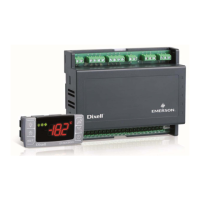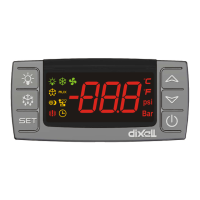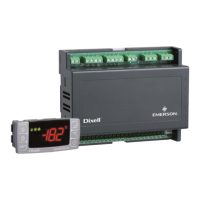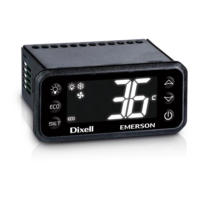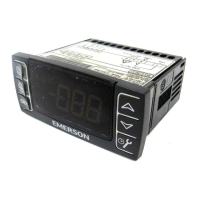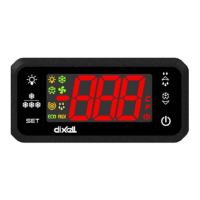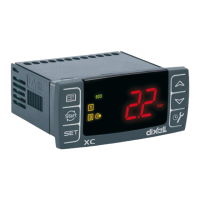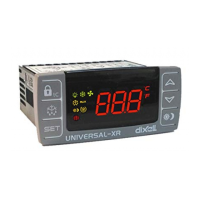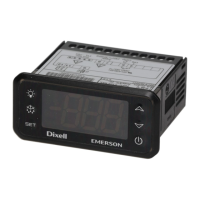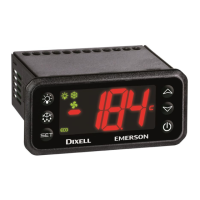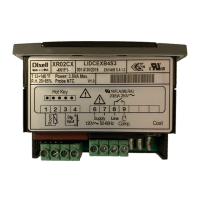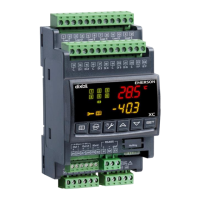1592023130 XM670K_XM679K GB r4.2 26.06.2017.docx XM670K - XM679K 4/10
11. COMMISSIONING
11.1 CLOCK SETTING AND RTC ALARM RESET
If the clock is present: [EdF = rtC] enable the defrost from rtc [Ld1 to Ld6].
UP arrow (press once) to access the fast access menu
HM identify the clock RTC submenu; press
HUr = hour press to confirm/modify
Min = minutes press to confirm/modify
…… don’t use others parameters if present.
Press for about 10 sec. The operation resets the RTC alarm.
Note: the rtC clock menu is present also on the second level of parameters. Warning: if the board shows the
rtF alarm, the device has to be changed.
11.2 ELECTRONIC VALVE SETTINGS – ONLY FOR XM679K
Some parameters have to be checked:
[1] Superheat temperature probe: Ntc, Ptc, Pt1000 with parameter P6C. The sensor has to be fixed at the end
of the evaporator.
[2] Pressure transducer: [4 to 20mA] or ratiometric P5C = 420 or 5Vr with parameter P5C.
[3] Range of measurement: check the parameter of conversion PA4 and P20 that are related to the transducer.
TRANSDUCER: [-0.5/7Bar] or [0.5/8Bar abs] the correct setup is relative pressure with PA4 = -0.5 and P20 = 7.0.
The [0.5/12Bar abs] the correct setup is relative pressure with PA4 = -0.5 and P20 = 11.00.
Example of virtual pressure with unique [4 to 20mA] or [0 to 5V] transducer:
XM6x9K_1
without transducer
XM6x9K_2 + with
transducer
XM6x9K_3+ without
transducer
LAN or not connect the
probe
LAN or not connect the
probe
[4] From EEV submenu: select the correct kind of gas with FTY parameter.
[5] Use the following parameters to setup the right valve driving, according to the valve datasheet from the
manufacturer.
12. KIND OF REGULATION FOR SUPERHEAT: SELF ADAPTIVE OR
MANUAL OPERATING MODE
12.1 GENERAL CONSIDERATIONS: SELF ADAPTIVE OR MANUAL SH CONTROL
The controller is able to regulate the superheat in manual or self adaptive mode, according to the value of the
parameter AMS, autotuing enabling.
With AMS = n: the normal SH regulation is performed
With AMS = y: the self adaptive SH regulation is performed
12.2 MANUAL OPERATING MODE - AMS = NO
The temperature and SH regulation can be performed in 2 ways according to the value of the parameter CrE:
on/off or continuous. See below in details.Standard temperature regulation
12.2.1 ON/OFF TEMPERATURE REGULATION [CrE = n]
1. Temperature regulation is ON/OFF and it depends on the SET point and HY parameter (dfferential) Valve
is closed when the temperature reaches the set point and open when the temperature is higher than set
point + differential.
2. The superheat is regulated to be closer to its set point.
3. With more pauses normally also the humidity is bigger.
4. Regulation pauses can be realized using Sti and Std parameters (during these pauses the valve is closed).
12.2.2 COUNTINUOUS REGULATION OF THE TEMPERATURE [CrE = Y] (with
superheat regulation):
1. The HY parameter becomes temperature band for PI control. A default good value is 6°C.
2. The regulation of injection is continuous and the cooling output is always on. The icon is always ON
excluding the defrost phase.
3. The superheat is regulated following the SSH parameter.
4. Regulation pauses can be realized using Sti and Std parameters (during these pauses the valve is closed).
5. Increasing the Int integral time it is possible to decrease the speed of reaction of the regulator on the HY
band.
12.3 SELF ADAPTIVE OPERATING MODE – AMS = YES
Auto-adaptive means to find and maintain the condition of the lowest super heating according to the load and
environmental conditions present in a given time on the evaporator.
The parameter AMS enables the self adaptive mode for the superheat regulation.
In this functioning the values of Pb and inC parameter are automatically set by the controller according to the kind
of applications and the response of the system.
With the AMS = YES, CrE must be set at NO.
The self adaptive algorithm does not affect, the functions related to the forced opening of the valve in special
situation such as:
Forced opening of the valve at start of regulation, parameter SFd (percentage) and SFd (time).
Forced opening of the valve after defrost, parameter oPd (percentage) and Pdd (time).
12.4 MINIMUM STABLE SUPERHEAT SEARCH - AMS = YES, ATU = YES
With the parameter ATU, the minimum stable superheat search function is enabled.
With ATU = yES controllers start searching the mimimum stable value for the SH, the minimum admitted value in
any case is LSH + 2°C (4°F).
Please take it in consideration, before setting LSH value.
12.5 VALVE CAPACITY REDUCING – MNF PARAMETER
Thanks to the parameter MnF it’s possible to reduce the capacity of the valve, to fine tune the valve to the
evaporator.
The regulation band is not affected from the modification of the MnF parameter.
See below the behaviour of the capcity of the valve, when the MnF parameter is adjusted.
NOTE: during the soft start phase (oPE, SFd), MnF parameter is not taken in consideration and the
capacity of the valve is set by the parameters oPE and oPd, respectively.
12.6 PRESSURE FILTERING – SUB PARAMETER
For a good SH regulation, it’s important to use a filtered value of the pressure.
This can be done by the parameter Sub.
Suggested values:
From 1-5 evaporators for each racks: Sub = 20
From 6-30 evaporators for each racks: Sub = 15
More than 30 evaporators for each racks: Sub =10
13. DISPLAY MESSAGES
No display: the keyboard is trying to work with
another board that is not working or not
present
Press for 3 sec UP arrow, enter the SEC
menu and select LOC entry.
Not present (configuration)
Not available (evaluation)
The keyboard is not able to communicate with
the XM670-XM679K
Verify the connection. Call the Service
P1
P2
P3
P4
P5
P6
PPF
CPF
Sensor brake down, value out of range or
sensor incorrectly configured P1C, P2C to
P6C.
PPF can be showed by slaves of pressure
that don’t receive the value of pressure.
CPF is showed when the remote probe 4 is
not working.
P1: the cooling output works with Con
and COF,
With defrost probe on error the defrost is
performed only at interval.
For P5, P6 and PPF: the percentage of
the valve opening is fixed at PEO value.
Temperature alarm from parameter ALU on
probe rAL.
Temperature alarm from parameter ALL on
probe rAL.
Door open alarm from input i1F, i2F or i3F =
after delay d1d, d2d or d3d.
Cooling relay and fan follow the odc
parameter. Cooling restart as specified
on rrd parameter.
Generic alarm from digital input i1F, i2F, i3F =
EAL.
Severe alarm of regulation lock from digital
input i1F, i2F, i3F = bAL.
Pressure switch lock i1F, i2F o i3F = PAL.
Minimum operating pressure threshold from
LOP parameter.
The valve output increases its opening of
dML quantity every second.
Maximum operating pressure threshold from
MOP parameter.
The valve output decreases its opening
of dML quantity every second.
Low superheating from LSH parameter and
SHd delay.
The valve will be closed; the alarm will
be showed after SHd delay.
High superheating from HSH parameter and
SHd delay.
Defrost will be performed with IdF till
restoring the settings of RTC.
Defrost will be performed with IdF.
Error with upload/download parameters.
Parameters have been correctly transferred.
13.1 ALLARM RECOVERY
Probe alarms P1, P2, P3 and P4 start some seconds after the fault in the related probe; they automatically stop
some seconds after the probe restarts normal operation. Check connections before replacing the probe.
Temperature alarms HA, LA, HA2 and LA2 automatically stop as soon as the temperature returns to normal
values.
Alarms EA and CA (with i1F = bAL) recover as soon as the digital input is disabled. Alarm CA (with i1F = PAL)
recovers only by switching off and on the instrument.
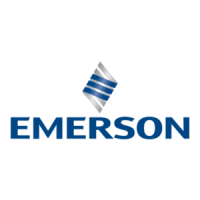
